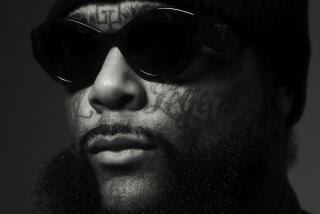KENNY G’S HIT BROKE ALL THE RULES
Nobody was more surprised than R&B;/jazz saxophonist Kenny G (ne Gorelick) when “Songbird,” a soothingly airy instrumental from his current “Duotones” album, cracked Billboard’s Top 20 pop chart--and subsequently became the biggest hit of his career.
While he had racked up modest hits in the past, including the 1984 Kashif-produced “Hi, How Ya Doin’ ” and last year’s remake of Junior Walker’s “What Does It Take to Win Your Love,” both were funky, dance tunes featuring black R&B; singers. His label, Arista Records, he claimed, had “pushed for more vocals on ‘Duotones.’ ” That the biggest hit on that album would be the gently melodic, yuppie-jazz-oriented “Songbird,” was a shock, he admitted.
“I’d always thought that if I had a hit with an instrumental, that it would either be a dance tune or taken from a movie score. This record really broke the rules,” Kenny G said in a recent phone interview from Cincinatti, noting that the piece was inspired by a decision to make the move from Seattle, his birthplace, to Los Angeles.
“The song represents the start of a new life to me. It was the catalyst.”
Indeed, it is looking like a new life for Kenny G. “Duotones,” produced by Preston Glass and Narada Michael Walden (both best known for their recent hit-making prowess with Kenny G’s labelmates Whitney Houston and Aretha Franklin) is his fourth album, but the first to go gold (sales of 500,000). The saxophonist was once part of R&B;/jazz keyboardist Jeff Lorber’s Fusion and also played with Barry White’s Love Unlimited Orchestra and has done stage work in the bands of Diahann Carroll, Liberace and the Mills Brothers. Not only will he perform Sunday as part of the Playboy Jazz Festival at the Hollywood Bowl, but he also is scheduled to headline two nights at the Universal Amphitheatre in November.
While it isn’t often that a jazz-oriented instrumental earns enough radio airplay to become a hit, there have been other exceptions to the rule this year--and they’ve all been by saxophonists. David Sanborn’s rollicking “Chicago Song” has become a staple on pop and black playlists, Najee’s remake of Anita Baker’s soulful “Sweet Love” made a respectable showing on the R&B; and jazz charts and Madhouse, a group composed of Prince’s cohorts, got heavy black radio airplay in the beginning of the year with “Six,” a saxophone-spiced jam.
“A saxophonist can be just as expressive as a good singer,” Kenny G said. He acknowledged that it had felt odd, as a non-singing musician, to have to feature singers to have a fair shot at a hit. “I had always had to push for more instrumentals. The success of ‘Songbird’ proves I was right. At least now I won’t have to worry about (the record company) pushing anymore vocals on me.”
It was with Lorber’s band in the early ‘80s that Kenny G first got the chance to focus full-time on R&B; (“that’s where my heart lies”), but it wasn’t long before he left to establish himself as a solo artist: “I just outgrew that association,” he said. But Like Lorber, he has received criticism from jazz purists who regard his highly accessible sound as a commercial sell-out, but he is philosophical about that.
“I’m not trying to relive jazz’s past,” he said. “It’s been done. I’m into new ideas and experimentation, so it doesn’t bother me if the purists don’t like my music.”
When asked to explain why “commercialism” is such a a dirty word in the jazz world, Kenny G only paused for a second. “Critics of commercial jazz probably don’t know how to create commercial jazz,” he speculated.
Not surprisingly, his favorite saxophonists are the equally accessible David Sanborn and Grover Washington, Jr., artists who have also suffered the wrath of jazz purists: “I like them because they’re always innovative. You can’t criticize people for having different and new ideas.”
Rather than hardcore jazz followers, Kenny G has always drawn fans of R&B;/pop music, probably due to the fact that two of his previous funk-oriented albums (“G-Force,” “Gravity”) were produced by Kashif, known for the hits he’s worked on with Whitney Houston, Evelyn “Champagne” King and George Benson. “Until ‘Songbird,’ I’d say my audience was 75% black,” Kenny G acknowledged.
Now, he said, his sold-out concerts across the country have been an equal black-and-white split: “And that,” he said, “is a bigger compliment to me than selling a million records. It makes you feel like you’re crossing bridges. And breaking down prejudices.”
More to Read
The biggest entertainment stories
Get our big stories about Hollywood, film, television, music, arts, culture and more right in your inbox as soon as they publish.
You may occasionally receive promotional content from the Los Angeles Times.










